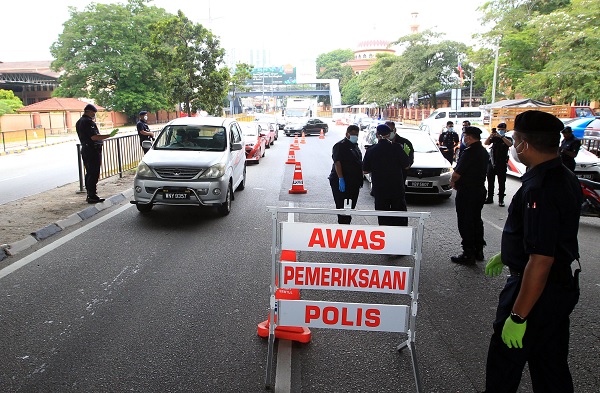Should Malaysia extend MCO?

KUALA LUMPUR (April 10): A day before the government is due to decide on whether to extend the movement control order (MCO) beyond April 14, two medical bodies have taken different positions on the matter.
While the Malaysian Medical Association (MMA) has called for the relaxation of the MCO, the Academy of Medicine of Malaysia (AMM) said the measures should be extended until Hari Raya Aidilfitri at end-May or even beyond that.
Both groups, however, agreed on the need to ease the socio-economic repercussions of the Covid-19 pandemic.
The MMA, in a statement yesterday, said the government should find a balance between enforcing measures to fight the virus, while also mitigating the economic impact of the pandemic.
While the MCO is targeted at limiting the spread of the virus by significantly reducing the contact between people, the association noted that such measures will have a severe economic impact.
“The longer it is in force, the worse the socio-economic damage will be. The authorities will have to find a balance between controlling the spread of the disease and avoiding irreparable economic damage,” it said.
The association quoted the World Health Organization (WHO) which had previously urged countries to balance the possible benefits and negative consequences of measures to be imposed and deploy strategies to encourage community engagement, gain trust and limit social or economic harm.
WHO had proposed organising worksites to ensure physical distance between persons, such as staggering shifts over time or converting on-site service to home delivery to keep more businesses open.
The MMA said the disruption of social activities, gainful employment, job losses and bankruptcies will have to be tempered with support for small businesses and the people, as no jobs means no income, which would mean that many would be hard pressed to survive prolonged MCOs or long-term lockdowns.
“It is likely that a stepwise relaxation of movement control will be the way forward. For instance, businesses may be allowed to operate with strict guidelines on how many people can be on the premises. Public transport may have to operate with limited loads, with frequent disinfection. Solitary public exercise will have to be permitted, to allow for mental and physical health issues.
“In all cases, strict hand hygiene and physical distancing must be observed, with masks if necessary. Interstate travel may need to be restricted, but will have to be prioritised for economic needs rather than personal,” said the association.
However, the association said large group congregations will have to be restricted still, until the likelihood of community viral spread comes down consistently, which might take months to years.
While movement control may be relaxed, diagnosis, isolation and treatment of Covid-19 patients cannot be let up and that point of care rapid tests, such as those for dengue and influenza, will need to be evaluated and made available within a few weeks.
“We will need to look into those who have been cured or who have protective antibodies, so that perhaps these convalescent people might get ‘certificates of infection and cure’, and therefore, be allowed to return quickly to society: to work, to pursue business, to study etc.
“This is being explored in Germany and northern European nations right now,” the MMA said.
Separately, the AMM said the Covid-19 pandemic has made it necessary for social distancing to be the new norm for a period of time until the situation is well under control.
“The risks of spreading the virus particularly to the elderly, in the case of a ‘balik kampung’ exodus, are very real,” the AAM said in a statement reported by Bernama.
“Risks associated with crowding at R&R stations and hence the failure of social distancing by travellers during this exodus and their subsequent return to urban areas will also need to be taken into consideration.
“For this year at least, be it Ramadan, Aidilfitri or even Haj gatherings — there is a need for control, monitoring and possible banning of these gatherings,” it added.
Stressing that the war against Covid-19 is far from over, the AMM said many sacrifices have been and will continue to be made this year.
“Let us show the world that Malaysians can exercise restraint as a nation and bring the war to a favourable close,” it said.
The group, however, also emphasised the need for the government to strengthen plans to ease the socio-economic repercussions of Covid-19, saying this will continue to have a major negative impact on all aspects of the Malaysian economy.
This, it added, is why “robust whole-of-government and whole-of-society approaches” are needed.
The MCO was initially enforced until March 31, but extended to April 14.
Read the full report in this week’s The Edge Malaysia
This article first appeared in The Edge Financial Daily, on April 10, 2020.
Stay calm. Stay at home. Keep updated on the latest news at www.EdgeProp.my. #stayathome #flattenthecurve
Click here to see residential properties for sale in Kuala Lumpur.
Never miss out
Sign up to get breaking news, unique insights, event invites and more from EdgeProp.
Latest publications
Malaysia's Most
Loved Property App
The only property app you need. More than 200,000 sale/rent listings and daily property news.
